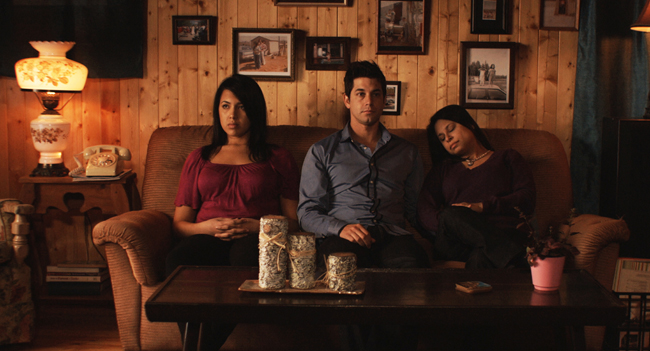Burying mother exhumes sisters’ pain

By Hoi Cheu
SUDBURY –Darlene Naponse’s recent DVD/Blu-ray release of her award-winning feature film “Every Emotion Costs” reflects a universal struggle.
The 2010 film tells a homecoming story of two sisters, Quilla and June, who return to their reserve to bury their mentally ill mother. The complex emotions evoked by the event are not just of mourning; sadness and anger are stirred up by the haunting memories of abandonment, resentment, and abuse. The story is about coping with these emotions, but does not collapse into sentimentality; wisdom and humour keep things entertaining.
Written and directed by Naponse, a citizen of Atikameksheng Anishnawbek, “Every Emotion Costs” reaches beyond its cultural borders; it moves me as a male Chinese immigrant. We do not share the same history, but we share the story because each of us has to reconcile with our dark emotions. The alcoholic father is by no means a Native American stereotype; my own grandmother got verbally violent after her evening glass of brandy.
We need to confront the ghosts of the bullies who hurt us in order to find peace and to learn to love. Every emotion counts, but every emotion also costs. In accounting the cost, we suffer; unable to pay the emotional debt, we suffer more. The repressed feelings have to be unearthed.
In “Every Emotion Costs”, through the ritual of burying their mother, the sisters exhume their pain and resentment, and by confronting each other’s self-disclosure, they cast away their ghosts and let go of each other’s debt.
While Naponse’s film tempts me to think that it reflects a universal human struggle, in Anglo-American intellectual culture the idea of “universality” is a guilty pleasure. It’s guilty because the intellectuals realize that European civilization has been imposing its values and religions as “universal truths” since first contact with indigenous peoples. To correct the wrong, intellectuals tend to avoid the word “universal,” humbly regarding every story as a reflection of a specific social experience.
What I mean by “universal” here is different. Perhaps the universal power of Naponse’s script comes from her experience as a counsellor. Since her first experimental short film exhibited at the Sundance Film Festival – “Abandoned Houses on the Reservation” – the issue and aftermath of abuse has always been one of her key themes. “Every Emotion Costs” is consistent with her work in this sense: the film is neither a negative representation of indigenous peoples dealing with alcoholism and mental illness, nor is it a positive representation because it demonstrates the bravery of the people in coping with such challenges.
“Every Emotion Costs” may sum up a counsellor’s experience and insights, but it is specific: it is a story straight from a medicine woman’s casebook. Paradoxically, because it is so specific, it becomes universal.
Hoi Cheu is a professor in Laurentian University’s Department of English.


